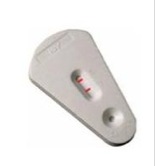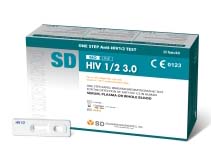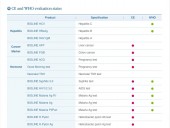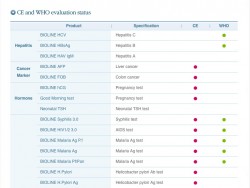
Kenyan government officials are blaming congestion at the Mombasa port for a rapid HIV instant test kit shortage that has all but put a halt to testing throughout the country.
A report in PlusNews, the global online HIV and AIDS news service of the United Nations Integrated Regional Information Networks (IRIN), says HIV/AIDS counseling and testing centers across Kenya are turning people away due to the rapid HIV instant test kit shortage.

Standard Diagnostics' Bioline® HIV 1:2 3.0 Rapid HIV Test Kit was delisted by the WHO in December, 2011
The rapid HIV instant test kit shortage follows Standard Diagnostics’ Bioline® HIV 1/2 3.0 Rapid HIV Test Kit being suddenly removed from the UN World Health Organization’s list of approved rapid HIV instant test kits in December 2011, after the South Korea manufacturer failed quality assurance tests.
There has been no reaction from the company on its website to the WHO delisting as an approved rapid HIV instant test, however the Bioline® HIV 1/2 3.0 Rapid HIV Test Kit is still displayed as approved by the WHO on the company’s “Certification status” webpage as of January 29, 2012.
HIV screening process in Kenya

Standard Diagnostics' Bioline® HIV 1/2 3.0 Rapid HIV Test Kit still showing WHO approval on the company website as of January 29, 2012
The HIV screening process in Kenya is a three-step process, comprising an initial rapid HIV instant test from one supplier (Determine), a second rapid HIV instant test from another supplier (Bioline), and a third, tie-breaking test from yet another supplier (Uni-Gold), in the event the first two rapid HIV instant tests conflict.
With Bioline removed as the second-step process, Uni-Gold was appointed as the the confirmatory test, with the third tie-breaking test currently utilizing the enzyme-linked immunosorbent assay (ELISA) test – requiring blood samples being sent to a laboratory adding a significantly longer period before the final result is known than with the rapid HIV instant test method.
The requirement to fill the void left by the sudden removal of an estimated one million Bioline tests from the market caught Uni-Gold’s makers by off-guard, with Mombasa port allegedly contributing to the HIV instant test kit shortage.
John Sankok, director of the Christian Missionaries Fellowship, told IRIN that until the necessary confirmatory tests arrived, HIV testing has been rationed, with what rapid HIV instant test kits that are available being prioritized for testing expectant mothers.
It’s a three-step process and no HIV testing can be done without all three rapid HIV instant tests being available, Mr Sankok told IRIN.
Nicholas Muraguri, head of the National AIDS and Sexually transmitted infections Control Programme, told IRIN congestion at Mombassa port was slowing clearances, with the situation expected “to normalize by the end of this month”.
Read the full IRIN report: Shortage of HIV test kits raises concerns
- Trinity Biotech’s Uni-Gold rapid HIV instant test kit
- Standard Diagnostics’ Bioline® HIV 1/2 3.0 Rapid HIV Test Kit still showing WHO approval on the company website as of January 29, 2012
- Standard Diagnostics’ Bioline® HIV 1:2 3.0 Rapid HIV Test Kit was delisted by the WHO in December, 2011
Subscribe to HIV Home Kit News by Email
HIV Home Kit rapid home HIV instant tests are a double antigen sandwich immunoassay one step in vitro screening test using colloidal gold conjugated recombinant antigens that provide qualitative detection of HIV infection (HIV I & HIV II antibodies) in human blood.
Contact us for more information on HIV Home Kit rapid home HIV blood test kits
Disclaimer: HIV Home Kit rapid home HIV instant test kits provide a screening analysis only. Diagnosis should not be based on a single HIV instant test result, but only after additional clinical and laboratory HIV blood test have been evaluated.
John Le Fevre
Latest posts by John Le Fevre (see all)
- Hetrosexuals highest risk group for HIV infection in Bali - May 1, 2013
- HIV “Functional Cure” Found in Thai Red Cross Trial - March 16, 2013
- Thailand in HIV/AIDS Crisis - November 30, 2012





